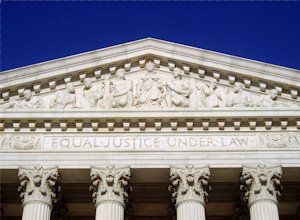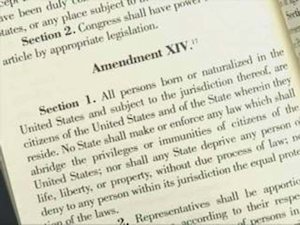The Supreme Court's Teaching Moment on "Judicial Activism"
 | | Some justice is more equal than others |
The judicial branch of the United States government is, in theory, only there to interpret and apply the law. The term "judicial activism" is political shorthand for moments when the judiciary steps out of this assigned role and actively creates or rewrites the law (though in reality, whenever a pundit talks about "judicial activism," he or she is usually just refering to a judicial decision he or she disagrees with). Last week, much to the chagrin of Republicans, the Supreme Court delivered two highly publicized rulings on the Affordable Care Act and same-sex marriage, and it wasn't long before loud voices on the right were once again decrying "judicial activism."
With the ruling on the Affordable Care Act, these voices have a point. Regardless of what you think of the law, it is very clearly written that federal subsidies only go to states that have set up their own exchanges, something most states opted not to do. This was clearly intended as an incentive system for the states, and seems superfluous at best if that wasn't the intent. Democrats have been arguing for years that this is simply a mistake written into the law--that it's not at all what was intended by the law's architects (Jonathan Gruber's comments to the contrary notwithstanding). Even if this is true, it is not the role of the judiciary to determine the legislature's intent; it is, to reiterate, only to interpret and apply the law. If the law was written incorrectly, then it is the legislature's job to fix it, not the judiciary's. Therefore, when the Supreme Court ruled that the law doesn't mean what the law clearly says (multiple times, I might add), then that qualifies as "judicial activism."
 | | I guess they forgot to ratify subsection (a): "except in the case of queers, who do not deserve any privileges or equal protections" |
However, with the ruling on same-sex marriage, there isn't any "judicial activism" to be found. Conservatives who like to talk about constitutionalism and the rule of the law should be deeply ashamed of Republicans who are arguing that the same-sex marriage ruling is invalid. What the Supreme Court did in this case is determine that certain laws barring same-sex marriage violate the equal protection clause of the Fourteenth Amendment and are thus (via the supremacy clause of the same) unconstitutional. The court struck down unconstitutional laws, which doesn't even remotely qualify as "judicial activism." Indeed, ever since Marbury v. Madison in 1803, determining the constitutionality of laws has been one of the primary duties of the Supreme Court.
The Fourteenth Amendment isn't exactly ambiguous, either. "No State shall make or enforce any law which shall abridge the privileges or immunities of citizens of the United States...nor deny to any person within its jurisdiction the equal protection of the laws." The Supreme Court didn't change the meaning of these words by determining that certain marriage laws violate them. It simply argued that same-sex couples are, by natural right, as entitled to "the privileges of citizens of the United States" as heterosexual couples, and that any state law that says otherwise is invalid.
I get that social conservatives don't like this, because they don't like same-sex marriage. But getting mad at the Supreme Court is an exercize in displaced aggression; their issue is with American culture, not the rule of law. Until they can make a valid argument as to why laws governing marriage should treat people differently on the basis of the genders involved and how this wouldn't violate the Fourteenth Amendment, the Supreme Court's ruling is the only one that makes sense.
 | | This tattoo, though legal in this country, is strictly forbidden by the Bible (Leviticus 19:28) |
I have yet to come across any such argument. As far as I can tell, the only objections people are raising about same-sex marriage are rooted in religious convictions, bigotry, and/or rigid traditionalism, none of which are good enough reasons to overturn the constitution and deny Fourteenth Amendment protections to a sizeable portion of the populace. What is most infuriating to me is that the people raising religious objections don't seem to be getting up in arms about the legality of a myriad of other behaviors the Bible clearly disapproves of, such as divorce. Besides, whether or not something is allowed in the Bible is not relavent to whether it is allowed in our country's law. Despite what they will no doubt tell you, this is a secular nation that values freedom of religion, not a Christian nation that enshrines all Christian values in its constitution.
Still, it would be unwise to treat every Supreme Court ruling as legal gospel. The Affordable Care Act decision, for example, is simply indefensible. I do not hide the fact that I think the Affordable Care Act is one of the worst pieces of legislation these United States have ever created, but I have endeavored to set my bias aside and find some kind of reason to accept the Court's decision that "established by the state" means "established by whomever." Reading the ruling hasn't helped, either, because all I can find in it are appeals to final consequence and appeals to motive, neither of which has any bearing whatsoever on the law itself.
The Supreme Court shouldn't decide the meaning of the law on the basis of what potential consequences their decision will reap or on the basis of what its architects claim they really meant. If we decide we live in a country where the law doesn't mean what it says and where we don't have to uphold the law when it would be inconvenient to do so, then we have rendered the law utterly meaningless. We would be powerless to defend ourselves against the whims of our government. This is unacceptable, and the Supreme Court's ruling is a nakedly political bit of tortured logic everyone--even supporters of the Affordable Care Act--should find abhorrent.
 | | Oh, the horror! |
But this brings me back to the other ruling, because quite a few Republicans are insisting that consequentialism and the intent of our founders is relevant in deciding the constitutionality of same-sex marriage. They talk about a slippery slope in which polygamy, incest, pedophilia, and bestiality become legal. They talk about how the founders never envisioned marriage as being anything but between a man and a woman. These arguments are meaningless, and they are implying oh-so-subtly that the Supreme Court should consider consequences and intents whenever it would benefit a Republican social position.
To a lesser extent, this also exposes the hypocrisy of the other side as well. To celebrate both decisions, as Democrats are doing, is to support the Court's activism in the ACA case while applauding its impartiality in the marriage case. Though reality has clearly demonstrated that you can have it both ways, I don't think you can without a pretty significant amount of cognitive dissonance or ambivalence about the rule of law.
So a pox on both your houses for supporting and advocating "judicial activism," and shame on the Supreme Court for its inconsistency.
-e. magill 7/1/2015
|
|